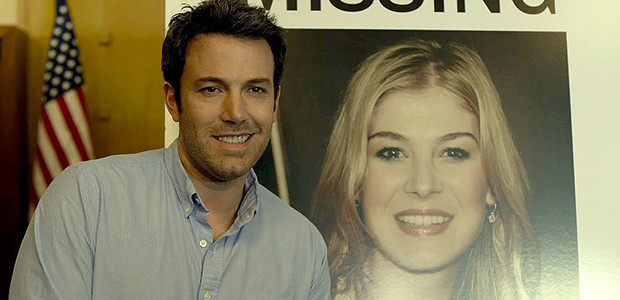Deliciously dark and wickedly funny, Gone Girl is a multi-layered potboiler that is every bit entertaining and compelling as it is disturbing and shocking. As both a crime drama and psychological thriller, nothing can prepare you for the whiplashing twists and turns that propels the story towards a rewarding and explosive finale, followed by ebbing shockwaves that will leave you in afterthought even after the end credits.
While there are several avenues of praise for this well-made crime caper, top credit goes to director David Fincher for what has to be his finest hour in the art of macabre storytelling. Adapted for the screen by Gillian Flynn’s novel of the same name, a large part of that art stems from the systematic crafting of a story that is intended to deceive the audience into thinking exactly what the narrator wants you to think. Perception, derived from illusion, forms the backbone of this story, including how we first relate to lead characters Nick Dunne (Ben Affleck) and his beautiful wife Amy Elliott-Dunne (Rosamund Pike). They live in Missouri after losing their jobs as writers in recession hit New York City. On the morning of their fifth wedding anniversary, Nick returns home from a bar he co-owns with twin sister Margo (Carrie Coon) only to find a shattered coffee table and his wife missing. First on the scene is Detective Rhonda Boney (Kim Dickens) who doesn’t find Nick’s answers very convincing. In fact, the more Nick is scrutinized the more he appears to be hiding something and within hours the media and Amy’s friends and relatives are out for his blood. With Amy’s disappearance becoming headline news, speculation rises and Nick becomes the prime suspect. Making matters worse, Nick doesn’t appear to be worried about his wife’s disappearance either.
Readers of the book will be happy to note that Flynn has also scripted the screenplay. In the wrong hands this film could have turned out pointless and vague – an undesirable yet unforeseeable byproduct of author-director mismatch. With Gone Girl, it’s hard to poke fun or fault when the screenplay is adapted by the same person who wrote the source material. If anything, the script is fine tuned for the screen and matched only by the skill of the director, who just happens to be master twister Fincher himself. It’s a perfect writer-director union as Fincher is not new to manipulating the audience into believing what they are seeing. That being said, the key words here are ‘union’ and ‘manipulation’, which turns out to be the flesh and blood of the story. On the outer layer this film might seem like a whodunit murder mystery, but at the core it is a comically dark social commentary about love and hate and the thin line in between. Before bringing that pot to a boil, Fincher employs a linear narration by allowing the mystery to unravel in real time alongside flashbacks that show how perfect Nick and Amy are when they first meet, to just how incompatible they become before the latter goes missing. Then there’s the manipulation. It’s not just about the Dunnes or spouse versus spouse or the disintegration of marriage as a spiritual institution. By the time we get into the thick of it, Flynn’s commentary manifests into a trudging dark horse tethered to the manipulation of truth and justice, before galloping towards a pound-for-pound revenge finale.
Despite clocking at just under 150 minutes, this is a film not to be missed. Even with an absorbing story and the director’s skill in telling that story, Gone Girl wouldn’t have turned out half as good as it is without the stellar performances of all involved, including supporting roles from Tyler Perry as Nick’s defense lawyer and Neil Patrick Harris as Amy’s creepy ex-boyfriend. But come awards season 2015, Gone Girl could be in the spotlight for no other reason than Pike’s sensational role that illustrates the idiom ‘Hell hath no fury like a woman scorned’. That alone should have a majority of viewers echoing the sentiment – W.T.F!
Rating: 




